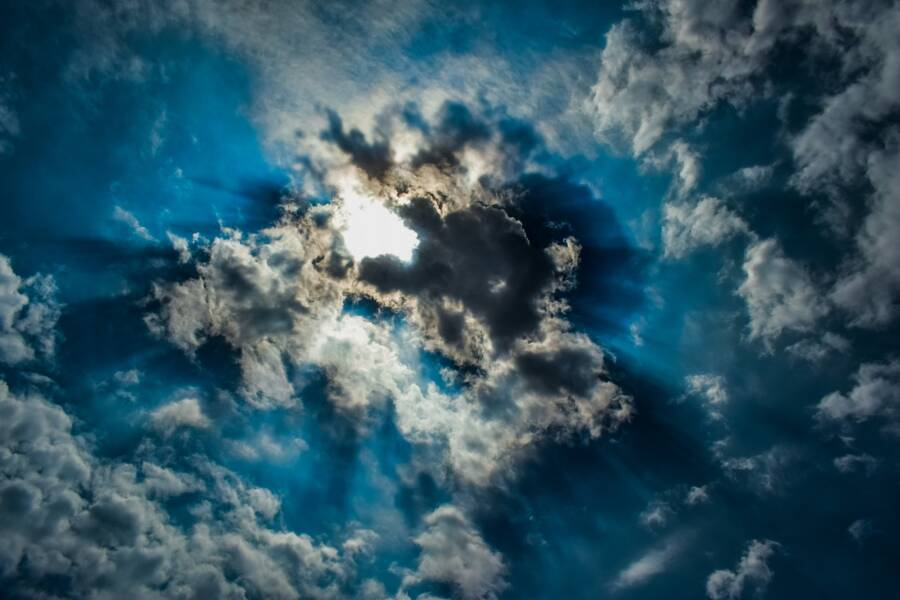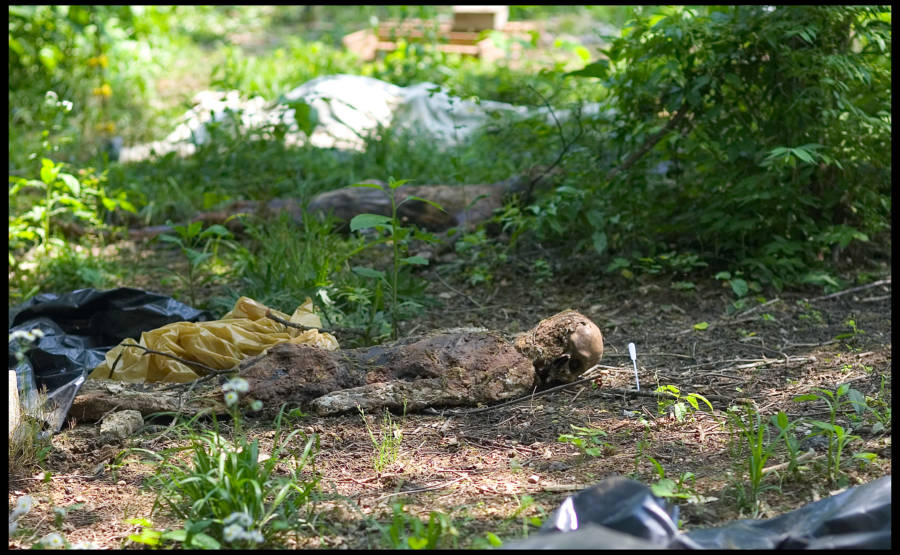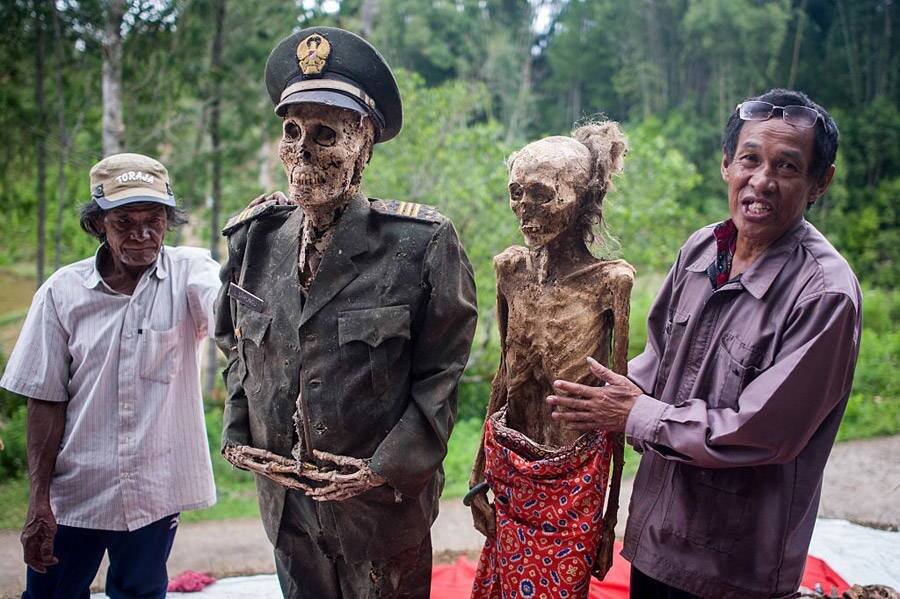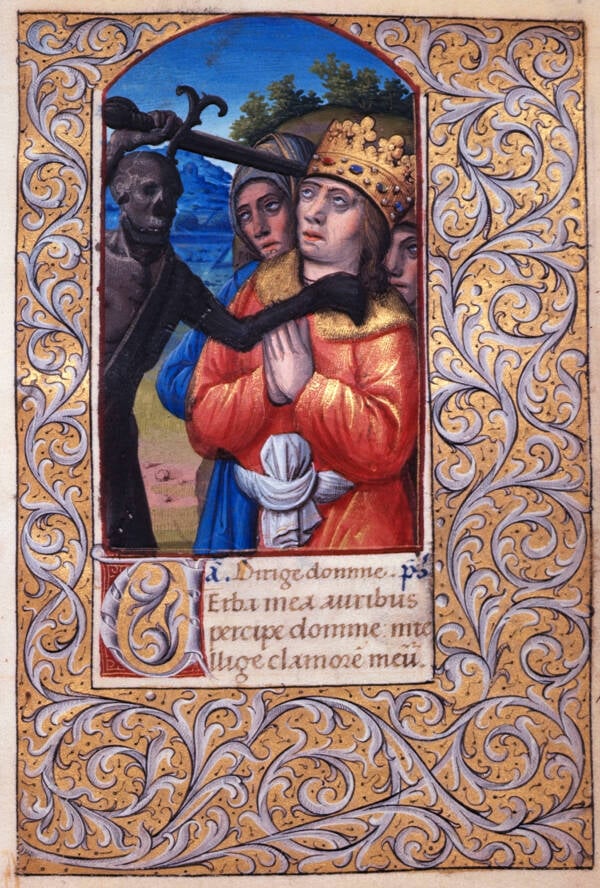what really happens to you after you die
Everything You lot Ever Wanted To Know About What Happens When You Die
No living human knows what happens when we die, but here's what we've gleaned from history and some well-nigh-death survivors who said they glimpsed the other side.
What happens when yous die is perhaps one of the greatest mysteries on Earth, simply because none of u.s. know the answer and yet all of us will experience death eventually.
Humankind'southward great thinkers have been pondering this question for millennia. And in 1994, an orthopedic surgeon named Tony Cicoria may take come shut to solving this great mystery when he was struck by a about-fatal bolt of lightning in upstate New York. Cicoria felt himself fly backward and the adjacent thing he remembered was turning around to see his body lying on the footing behind him.
For a moment, Cicoria reported, he stood there and watched a woman perform CPR on his body before he floated up a flying of stairs to watch his children play in their rooms.
"Then I was surrounded by a bluish-white light," Cicoria recalled, "an enormous feeling of well-being and peace… The highest and lowest points of my life raced by me. I had the perception of accelerating, being drawn up… Then, as I was proverb to myself, 'This is the most glorious feeling I have always had' — slam! I was back."

Pixabay All of the world'south civilizations throughout human history take contemplated what happens when nosotros dice, both scientifically and spiritually — and the answers accept ever varied quite a flake.
According to Dr. Sam Parnia, who has studied almost-death experiences for years, Cicoria'due south encounter was not an uncommon ane.
"Expiry is a process," Parnia added. "it is not a black and white moment."
In contempo years, doctors like Parnia and close-phone call survivors like Cicoria accept helped deepened humanity's agreement of what happens when nosotros die.
What Scientific discipline Says Most What Happens When You Die
While nosotros may not fully sympathize the feeling of dying until we feel it for ourselves, we do know what happens to our bodies right before and afterwards decease.
At first, according to Dr. Nina O'Connor, a person'southward animate will get irregular and unusually shallow or deep. Their jiff can and so begin to sound like a rattle or a gurgle, which happens because the person isn't able to cough upward or swallow secretions in their chest and throat.
"All of it comes from the process of the body slowing and shutting downwards," she says. This audio has been fittingly called "the death rattle."
And then, at the moment of death, every muscle in the body relaxes. This may cause the person to moan or sigh every bit any excess air is released from their lungs and into their throat and vocal cords.

David Howells/Corbis via Getty Images Corpses disuse at the globe's beginning body farm at the Academy of Tennessee.
Meanwhile, every bit the torso relaxes, the pupils dilate, the jaw may autumn open, and the skin sags. If the person has whatsoever urine or feces in their torso, these will and so be released likewise.
But as Parnia suggested, decease doesn't happen in an instant and some researchers affirm that our brains can operate up to ten minutes after our hearts stop beating.
Inside the first hour after death, the torso begins to experience the "death chill" or algor mortis. This is when the corpse cools from its normal temperature to the temperature of the room around it.
After a couple of hours, blood will begin to pool in the areas of the trunk that are closest to the basis due to gravity. This is known as livor mortis. If the trunk stays in the same position for several hours, these trunk parts will start to wait bruised while the rest of the body grows stake.
Limbs and joints will then begin to stiffen within a few hours after death during a process called rigor mortis. When the trunk is at its maximum stiffness, the knees and elbows will be flexed and the fingers and toes may appear crooked.
Just after around 12 hours, the process of rigor mortis will showtime to reverse. This is due to the decay of internal tissue and it lasts betwixt one and three days.
During this reversal, the skin begins to tighten and shrink, which tin create the illusion that the person's hair, nails, and teeth accept grown. This skin tightening is likewise responsible for the illusion that blood has been sucked from the corpses, which in plow inspired some of the vampire legends of medieval Europe that nosotros even so know today.
What Physicians Say It Feels Like When We Dice

Pixabay According to some physicians, expiry can feel similar either a great depression or the need to poop.
Aside from the scientific discipline of death and decomposition, humans accept always too sought to know what the awareness of dying feels like. Because well-nigh of usa, dissimilar Cicoria, won't ever have a near-death experience, nosotros are simply left wondering: What does it experience like to dice?
And according to full general practitioner Dr. Clare Gerada, death can sometimes feel like having to apply the bathroom.
"Most people will die in bed, but of the group that don't, the majority will die sitting on the lavatory. This is because there are some concluding events, such every bit an enormous centre attack or clot on the lung, where the actual sensation is every bit if yous want to defecate."
If a person doesn't die from a concluding event, nonetheless, and instead passes on more slowly from a long-term affliction or old age, dying may experience a flake similar depression. Toward the terminate of their lives, people tend to eat and drink less, which results in fatigue and a lack of free energy. This causes them to move, talk, and recollect slower.
Dr. O'Connor adds that "the physical fatigue and weakness [of people nigh the terminate] is profound. Simple things, like getting up out of bed and into a chair could exist exhausting — that could be all of someone'southward energy for a mean solar day."
But considering information technology's so frequently difficult or impossible for dying people to express how they're feeling during the issue, the question of how it feels when we dice remains largely shrouded in mystery.
What Happens To Your Torso After You Dice?
While the more ineffable matters of what it feels similar to die may always exist fuzzy, what's very clear is what happens to the torso in a practical sense after death. But how we handle our dead bodies and what ceremonies and rites we perform nevertheless varies greatly around the world.
Typically in the West, bodies are embalmed later on death. The process of embalming dates back to the ancient Egyptians — and fifty-fifty earlier — when some cultures mummified their dead in the hopes that their soul could i twenty-four hours return to the corpse. Aztecs and Mayans as well had a history of mummifying their dead, as did many of the world's near studied civilizations in the pre-mod era.
A mortician talks about her work.
But as for modern, Western practices, embalming in the U.S. just became pop during the Civil State of war every bit a means of transporting fallen soldiers back to their families to be cached.
Modern embalming is a meticulous procedure. As before long as a md has certified that a person is dead, the body is transported to a coroner who may request a postmortem examination. This procedure requires a pathologist to complete an external and internal examination. For the internal test, the pathologist removes every organ of the body, from the natural language to the encephalon, then inspects them and places them dorsum in the trunk.
Next, the body is drained of all its fluids, which are replaced with a preservative like formaldehyde. Meanwhile, the throat and nose are packed with cotton wool. The oral fissure is stitched or glued airtight from the within. The hair is washed, the nails are cleaned and cut, and cosmetics are practical to the confront and skin. Plastic caps are practical under the eyelids to help them hold their shape.
Finally, the torso is dressed and placed in a bury. From hither, it can be buried or cremated, depending on the person'due south preference, civilization, or religion.
In many not-Western cultures, in fact, decease rituals are very different from what well-nigh of us might know.

Sijori Images/Barcroft Images/Getty Images What happens after you dice is a question with a unique answer in the Toraja civilisation, in which they dress upward long-deceased family unit members and walk them around.
This is particularly true for the Toraja people of Indonesia. They believe that the expressionless are never really gone, so people are not so quick to dispose of their loved ones' bodies.
When a Toraja person dies, their family cares for their body until a proper funeral can be prepared — which tin take weeks to months or even years.
During this time, the deceased is treated as if they are simply ill instead of dead. Once the funeral is finally set up, the Toraja village honors the dead with prayers, dancing, and creature sacrifice before they take the body to its tomb.
All the same, the body is not left in its tomb forever. Every ane to iii years, the Toraja people exhume their loved ones, wipe them clean, apparel them in new apparel (and sunglasses), and walk them around so that they can do things like introduce them to any new family unit members.
Jews, on the other hand, practise non embalm their loved ones and instead coffin them quickly afterward they are declared dead. Rabbi Corey Helfand says, "[According] to the texts nosotros read in Genesis, with Adam coming from the Earth, we give our bodies back to the Earth and to God — that's why nosotros bury our dead."
Jews are thus typically cached naked, wrapped in a cotton canvass, and laid in a patently pine coffin and so that the body may decompose naturally. Muslims practice the same with their dead, burying them without a coffin in some cases.

Public Domain A depiction of death personified and holding a sword, circa 1500, taken from Book of Hours, containing prayers and rites.
Medieval Christians, on the other hand, lived their lives because and preparing for death, generally considering they were surrounded by it. Without modern medicine, there were loftier rates of infant bloodshed and disease, while dearth and war were too rampant. This was the age of the Black Death, afterwards all. Christian Europeans (and Americans) thus however tend toward death rituals that are more than highly prepared and orchestrated in terms of things like coffins and funerary rites.
Meanwhile, the ancient Egyptians believed that the dead had to first pass through the underworld earlier they could rest in the afterlife. But the journey to the afterlife was riddled with obstacles, so the ancient Egyptians cached their loved ones with scrolls inscribed with spells to protect and guide them to their final resting identify. Archaeologists have fifty-fifty found maps of the underworld in tombs meant to directly the dead in the afterlife.
What Really Happens After You Die — From People Who've Been At that place
Dr. Oz interviews Dr. Sam Parnia about what it's like to die, based on his research.
Setting aside what happens to the deceased's torso subsequently they dice, what happens to them, to their very being and their soul? While the world's cultures and religions tin can offer some possible answers, so can survivors of about-death experiences.
In 1988, actress Jane Seymour went into anaphylactic daze. As her body began to shut downward, her listen stayed enlightened.
"I had the vision of seeing a white calorie-free and looking down and seeing myself in this bedroom with a nurse frantically trying to save my life and jabbing injections in me, and I'k calmly watching this whole thing," she said, describing a scene common in reports from those who have almost died.
Dr. Sam Parnia recorded this phenomenon with multiple survivors during his 2014 report of virtually-death experiences. Ane patient could recall what was happening in the hospital for a full three minutes after his eye had stopped.
"The man described everything that had happened in the room, but chiefly, he heard two bleeps from a auto that makes a dissonance at three-minute intervals," said Parnia. "And so we could time how long the feel lasted for. He seemed very credible and everything that he said had happened to him had actually happened."
While not every survivor that Parnia spoke with had an out-of-body experience, every bit many equally forty percent of them do recall having some sort of "awareness" when they were declared clinically dead.
Even later flatlining, many survivors recall seeing a bright, welcoming calorie-free, or their deceased relatives, or the doctors and nurses working on them in the hospital.
What'due south more, many of the people who experienced consciousness afterward expiry call back not wanting to return to their bodies.
However, many scientists remain skeptical of these reports and attribute them to everything from lucid dreaming to a lack of oxygen in the brain. While more inquiry needs to be washed before we know for certain what happens when we die, perhaps it is at least comforting to think that our consciousness floats on as our bodies expire.
After learning nigh what happens when we dice, read up on the most unusual deaths in history. Then, check out these haunting photos of people correct before they died.
Source: https://allthatsinteresting.com/what-happens-when-you-die
0 Response to "what really happens to you after you die"
Post a Comment